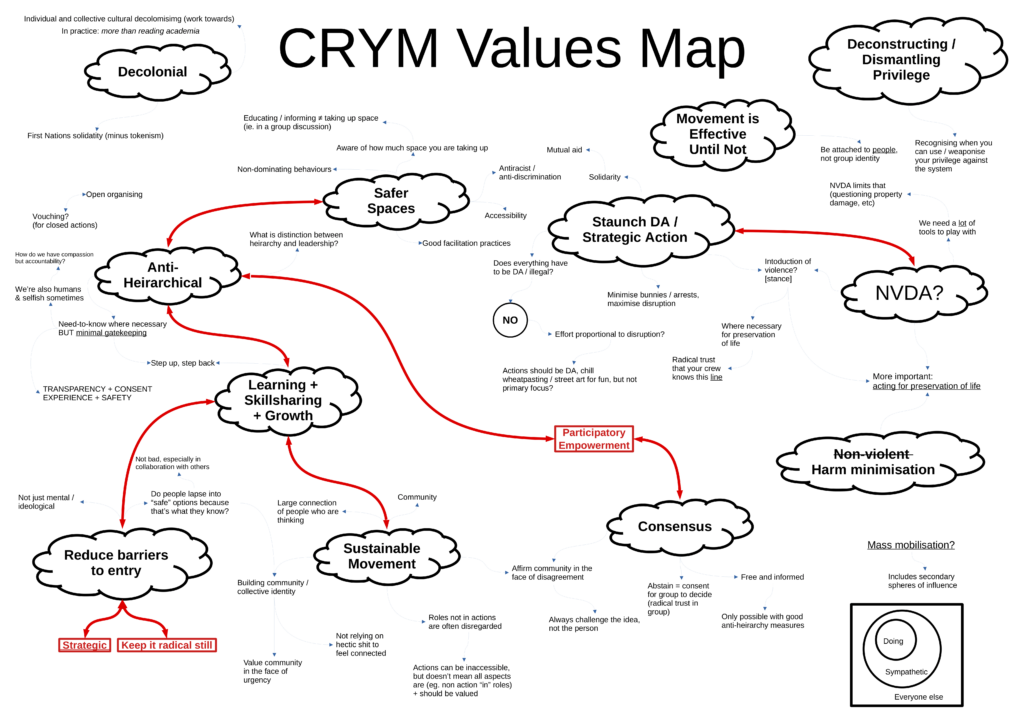CRYM’s values underpin how it operates and takes action in the community, they also continue to be reflected on and adapted and extended.

CRYM’s values written out:
- Decolonial
- First nations solidarity (minus tokenism)
- Individual + collective cultural decolonisation
- Which looks like more than just academia
- Equitable and Safer spaces
- Non-dominating behaviors
- Be aware of how much space you’re taking up
- Sharing knowledge/experience isn’t always the same as taking up space
- Be aware of how much space you’re taking up
- Actively anti-bigoted and anti-discriminatory
- Opposing oppressive systems – racism, sexism, queerphobia, classism, ableism, colonialism, misogyny and the patriarchy. **
- Accessibility
- Actively making spaces less disabling to engage and interact with.
- Making our community inclusive
- Good facilitation practices
- Everyone deserves to feel heard, but should not dominate other voices to do so
- Self facilitate **
- Open organising & Vouching **
- We value the balance of these two things, and strive to find a good balance
- Open organising should be balanced with and feed into vouched organising
- Open organising alongside vouched spaces
- Open organising weighted against the importance of secure spaces
- Non-dominating behaviors
- Anti-Hierarchical
- Need to know where necessary BUT not where it becomes gatekeepy
- In matters of safety, lived experience/expertise may grant you more authority, but every individual should retain autonomy
- Transparency, consent and reflection around when this happens
- We’re also humans (in a flawed society) and are sometimes selfish
- How do we have compassion but accountability, how do we encourage reflection?
- There is a difference between hierarchy and leadership
- Step up, step back
- Participatory empowerment
- Learning + Skillsharing + Growth
- Step up, step back
- Actively share and learn practical skills, theory and ideas
- Expanding our comfort zone
- Creating community around radical skills and knowledge
- Strategic reduction of barriers to entry
- Make it easier to get involved, regardless of your experience *
- These barriers could be mental, physical, ideological, financial, etc
- (talk about adding a point about being disabling later)
- Keep it radical still
- Our tactics and values should not be diluted to appease people who don’t support radical action ** (passive)
- Open organising <–> Vouching
- Creating a sustainable a movement
- Community
- Building collective identity and connection
- Creating connection in safe environments, and not just relying on hectic situations to create it *
- Always valuing community despite facing the crisis we’re in
- Affirm community in the face of disagreement
- Always challenge the idea, not the person
- No arrests for the sake of arrest
- Build strong resilience and capacity – avoid burnout *
- Community
- Deconstructing/dismantling Privilege
- Reflecting on how your privilege allows you to interect with the space in a way that others can’t
- Recognise when you can use / weaponise your privilege against the system
- Recognising the impacts of doing so is important
- Create space for others, rather than just taking up space because it’s easier for you as a result of your privilege
- Movement is effective until its not
- Form attachment and connection with people not the collective identity **
- Create new movements rather than transforming what exists
- Staunch and Strategic Direct Action
- Solidarity
- Mutual aid
- We’re here to defy and disrupt *
- No solely symbolic actions
- No arrests for the sake of arrests
- The resources we put in should be proportional to the disruption it causes
- Open organising <–> Vouching
- Solidarity
- Harm minimisation
- We are resisting for the preservation of life ***
- There’s a line between needless violence that reduces harm – ie. self defense *
- Radical trust in the network as to where that line is *
- Consensus
- Freedom to make informed decisions based on consensus *
- So long as it doesn’t become hierarchy *
- You don’t have to assent to consent *
- Having radical trust in the group to make decisions *
- Affirm community in the face of disagreement
- Always challenge the idea, not the person
- Freedom to make informed decisions based on consensus *

